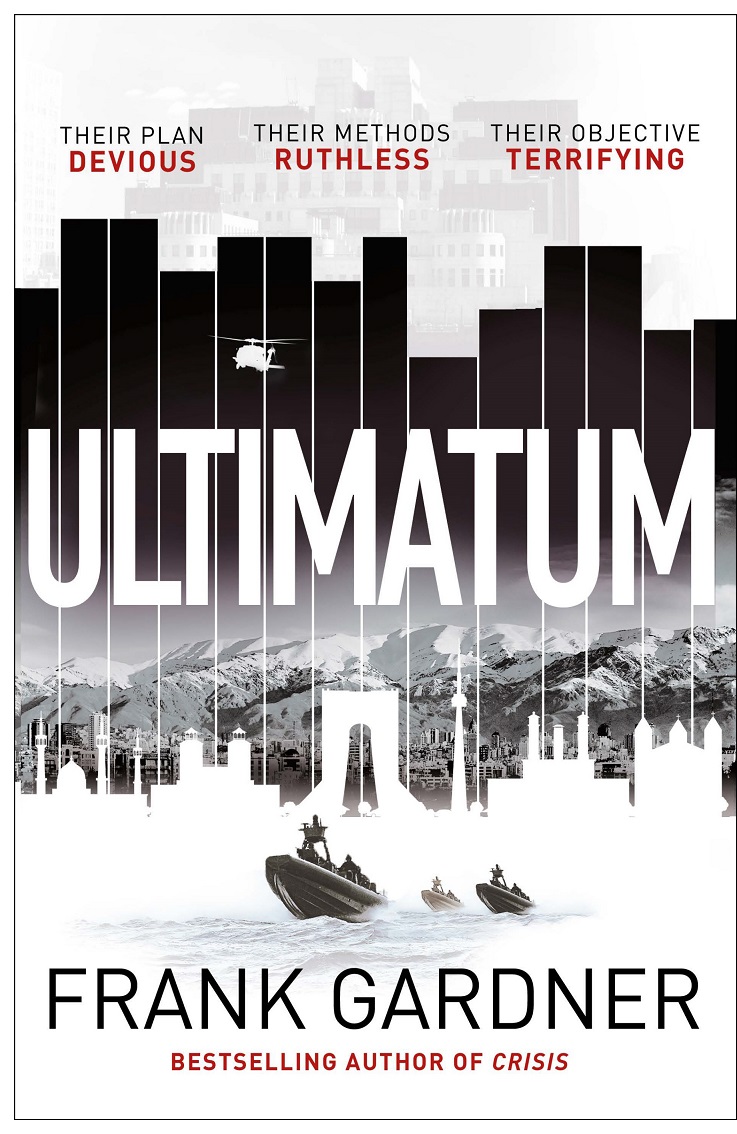Frank Gardner: Ultimatum review - topical terrorism | reviews, news & interviews
Frank Gardner: Ultimatum review - topical terrorism
Frank Gardner: Ultimatum review - topical terrorism
A Persian predicament: Luke Carlton returns to confront Iran's enemies within

The journalist Frank Gardner has turned to fiction to illuminate with imagination the world that he knows inside out from years of reporting.
We inhabit his fictional world on the basis that he will portray a riff on reality with nuance and understanding, all the better to escort us through the stresses and strains of the region's religious and political fissures today. Ultimatum is predicated on Iran, its nuclear programme and its relations with the West, and the phrase that sets the mood comes from a Persian proverb: “Patience is bitter, but it has a sweet fruit.”
It is a terrifying and topical novel. Luke Carlton is the MI6 agent who featured in Gardner’s first novel (so the signs are that a series is in train), whose backstory emerges periodically: orphaned at 10, a degree (first-class) in international relations from Edinburgh, 12 years in the Royal Marines, four in the Special Boat Service (espionage and spying expeditions, including rescues), then recruitment by MI6, which gave him, as he puts it, some of the best training in espionage the world has to offer.
 Incredibly fit, fearless and intelligent, we assume he’s somewhere in his late thirties or early forties. He has a girlfriend, Elise, whose family has virtually adopted him, and whose mother’s illness and death from liver cancer is a running element in the novel. Elise’s attempts to get in touch with him, and distress that he is not there for her are another motif, and quite unbelievable in this context: their relationship does not ring true for a moment. Elise comes across as needy, insensitive and obtuse, although Carlton feels – cliché on board – conflicted that he is not as supportive as she needs. This highlights a genuine problem. It is difficult to engage with the characters as one does, say, with those in the spy and thriller novels of Le Carré or Mick Herron. They are simply insufficiently rounded, not interesting enough.
Incredibly fit, fearless and intelligent, we assume he’s somewhere in his late thirties or early forties. He has a girlfriend, Elise, whose family has virtually adopted him, and whose mother’s illness and death from liver cancer is a running element in the novel. Elise’s attempts to get in touch with him, and distress that he is not there for her are another motif, and quite unbelievable in this context: their relationship does not ring true for a moment. Elise comes across as needy, insensitive and obtuse, although Carlton feels – cliché on board – conflicted that he is not as supportive as she needs. This highlights a genuine problem. It is difficult to engage with the characters as one does, say, with those in the spy and thriller novels of Le Carré or Mick Herron. They are simply insufficiently rounded, not interesting enough.
Oddly, the most sympathetic figure here is a young, beautiful and disaffected Iranian, Tannaz Zamini: she and her cohorts who struggle in a repressive society come across most vividly, as do the glimpses into their lives. Her father, Karim, is an almost unbearably cruel and fanatical member of the top brass of the Iranian Revolutionary Guards, a village boy who married up (also part of the story).
Karim is the villain, a top man in a secret and complex plot to destabilise the whole region by the audacious kidnapping of the visiting British Foreign Secretary (the UK is the “Little Satan” as far as Iran is concerned, compared to the “Great Satan”, the US). But he is himself a kind of double agent, working as he sees it for the enhancement of Iran but against his own government. He has a lead role in the mysterious “Circle”, an unauthorised group within the Revolutionary Guards which is working undercover to ensure that Iran’s nuclear programme goes ahead. We never meet its nameless top man, who speaks only in whispers, to top and tail the narrative.
The thrust of the plot is clear, to stop and neutralise a fiendish plot that could potentially unleash another Gulf War, or an even more global conflict. Gardner’s style is addictive: short episodic chapters, unrolling in real time over just a few days. Strategic discussions from Whitehall, especially COBRA and Downing Street, Vauxhall (MI6) and top secret English military bases are layered between action in the field.
The politics feel absolutely up-to-date and the fictional counterparts of politicians and spies believable in their attitudes and actions
Carlton starts in Armenia, where he is sent to liaise with an Iranian double agent – a failure, body count only three – then all over Iran, from Tehran to the Persian Gulf, with a side trip to Abu Dhabi. Luke’s cover is as an art dealer (well, it all seemed almost plausible at the time). As he gets close to the Iranians he needs to help him, he hears heartrending stories of the horrible imprisonments and torture of their peers. His response reminds us how in this world it is the end that justifies the means.
What is utterly fascinating are the short pithy chapters of committees and meetings – yes, meetings – and discussions of all kinds between the commanders of submarines, the-high ranking officers and leaders of all kinds of British institutions and political committees, presented alongside the sheer complexities of dealing with crises both political and private (and, of course, involving the press, whereby another story).
The politics feel absolutely up-to-date and the fictional counterparts of politicians and spies believable in their attitudes and actions. A lot of geopolitical facts are rolled out, with show-and-tell explanations of everything from the global importance of the Strait of Hormuz to the so-called Marlboro small-boat smugglers bringing in cigarettes from Oman to sell at vast profit in Iran. But the curious combination of soft-heartedness and professional brutality on the part of Gardner’s hero is neither attractive nor empathetic, regardless of whether he saves the day.
Even if we are painlessly introduced to a great deal of recent history, we gain little understanding of how the minds of the fanatic and cold-blooded torturers have become that way. There is more than a hint that the West’s post-war meddling in the region, notably the 1953 overthrow of Mosaddegh in Iran, remains the basis of much of its instability today. Gardner’s riveting plot really does illuminate both the past and today’s headlines. It would be a spoiler to reveal the shocking climax, but there is a hint of more to come: roll on novel three, and please, could we have a map?
- Ultimatum by Frank Gardner (Bantam, £12.99)
- Read more book reviews on theartsdesk
The future of Arts Journalism
You can stop theartsdesk.com closing!
We urgently need financing to survive. Our fundraising drive has thus far raised £49,000 but we need to reach £100,000 or we will be forced to close. Please contribute here: https://gofund.me/c3f6033d
And if you can forward this information to anyone who might assist, we’d be grateful.

Subscribe to theartsdesk.com
Thank you for continuing to read our work on theartsdesk.com. For unlimited access to every article in its entirety, including our archive of more than 15,000 pieces, we're asking for £5 per month or £40 per year. We feel it's a very good deal, and hope you do too.
To take a subscription now simply click here.
And if you're looking for that extra gift for a friend or family member, why not treat them to a theartsdesk.com gift subscription?
more Books
 'We are bowled over!' Thank you for your messages of love and support
Much-appreciated words of commendation from readers and the cultural community
'We are bowled over!' Thank you for your messages of love and support
Much-appreciated words of commendation from readers and the cultural community
 Elizabeth Alker: Everything We Do is Music review - Prokofiev goes pop
A compelling journey into a surprising musical kinship
Elizabeth Alker: Everything We Do is Music review - Prokofiev goes pop
A compelling journey into a surprising musical kinship
 Natalia Ginzburg: The City and the House review - a dying art
Dick Davis renders this analogue love-letter in polyphonic English
Natalia Ginzburg: The City and the House review - a dying art
Dick Davis renders this analogue love-letter in polyphonic English
 Tom Raworth: Cancer review - truthfulness
A 'lost' book reconfirms Raworth’s legacy as one of the great lyric poets
Tom Raworth: Cancer review - truthfulness
A 'lost' book reconfirms Raworth’s legacy as one of the great lyric poets
 Ian Leslie: John and Paul - A Love Story in Songs review - help!
Ian Leslie loses himself in amateur psychology, and fatally misreads The Beatles
Ian Leslie: John and Paul - A Love Story in Songs review - help!
Ian Leslie loses himself in amateur psychology, and fatally misreads The Beatles
 Samuel Arbesman: The Magic of Code review - the spark ages
A wide-eyed take on our digital world can’t quite dispel the dangers
Samuel Arbesman: The Magic of Code review - the spark ages
A wide-eyed take on our digital world can’t quite dispel the dangers
 Zsuzsanna Gahse: Mountainish review - seeking refuge
Notes on danger and dialogue in the shadow of the Swiss Alps
Zsuzsanna Gahse: Mountainish review - seeking refuge
Notes on danger and dialogue in the shadow of the Swiss Alps
 Patrick McGilligan: Woody Allen - A Travesty of a Mockery of a Sham review - New York stories
Fair-minded Woody Allen biography covers all bases
Patrick McGilligan: Woody Allen - A Travesty of a Mockery of a Sham review - New York stories
Fair-minded Woody Allen biography covers all bases
 Howard Amos: Russia Starts Here review - East meets West, via the Pskov region
A journalist looks beyond borders in this searching account of the Russian mind
Howard Amos: Russia Starts Here review - East meets West, via the Pskov region
A journalist looks beyond borders in this searching account of the Russian mind
 Henry Gee: The Decline and Fall of the Human Empire - Why Our Species is on the Edge of Extinction review - survival instincts
A science writer looks to the stars for a way to dodge our impending doom
Henry Gee: The Decline and Fall of the Human Empire - Why Our Species is on the Edge of Extinction review - survival instincts
A science writer looks to the stars for a way to dodge our impending doom
 Jonathan Buckley: One Boat review - a shore thing
Buckley’s 13th novel is a powerful reflection on intimacy and grief
Jonathan Buckley: One Boat review - a shore thing
Buckley’s 13th novel is a powerful reflection on intimacy and grief
 Help to give theartsdesk a future!
Support our GoFundMe appeal
Help to give theartsdesk a future!
Support our GoFundMe appeal

Add comment